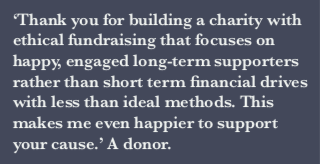Appendix 2: What happens if World Land Trust raises more money than is targeted in an appeal?
In his second appendix around the World Land Trust’s fundraising strategy, John Burton shares a blog post he once intended to post but was deemed too controversial. Well-worth a read!
- Written by
- John Burton
- Added
- January 02, 2019

This was a blog that I wrote, but was not published. Although it entirely reflects my views and would have been the ethos under which WLT was managed, after I stepped aside as CEO it was considered too outspoken and controversial.
What happens if World Land Trust raises more money than is targeted in an appeal?
During my time as CEO, this rarely happened (unfortunately). But sometimes a fundraising appeal can raise more money than the initial target, and this indeed did happen last week when we concluded the appeal for the Olympic Rainforest in Brazil. Coinciding with the Rio Olympics and supported by our patron Steve Backshall and his fiancee, Helen Glover, it was an incredibly successful appeal, and also brought WLT a lot of new supporters. So what happens to the surplus?
First it must be borne in mind that most of our land purchases are agreed in currencies other than sterling. Consequently we have to be prepared for fluctuations in the value of sterling (and in this particular case Brexit meant that sterling had devalued by around 10 per cent since the initial agreement to purchase was made -- in this instance in Brazilian Reals). However, should we still be over target, when the land is all paid for, the funds will definitely be used to support the same project, as there are always many other expenses involved. In particular the costs of the Rangers (Keepers of the Wild) who are so critical to the long-term protection of the land once purchased. I have always been able to assure all donors that any excess funds always go to the project that has been donated to. Unlike some other charities, we have always prided ourselves on transparency and not using small print that allows funds to be diverted. I believe that this has been critical to the trust that we have built up not only with our donors, but with our trustees, patrons, council members and all other supporters. We have three no-no areas: free gifts, aggressive fundraising techniques (particularly phone and chugging), and the use of small print.
What do you, our loyal supporters and my readers think? I know not everyone agrees with me, and there may be a case for widening our approach. Many fundraising methods require spending significant amounts of money to be spent up front. But they can also potentially bring in much larger amounts than WLT currently raises. It's a debate frequently held within charities, but rarely discussed by the donating public. And only apparent if you have a detailed understanding of how accounts are presented. It is particularly relevant, as there is currently a Donor Experience Commission looking at all aspects of how the donating public perceive charities, and the way they respond and interface with the donor. I am actively involved, and would welcome responses to these and any other issues, either here on the website for the public to see and comment on, or in emails direct to me.
I should point out that this level of transparency has also built trust with our overseas partners; think how they would feel if we raised money for ‘their’ rainforest and it went to a completely different project -- or even just supporting WLT's core costs?
Editor’s note. The context behind this series:
This short series from John Burton sets out to capture in detail one CEO’s view of fundraising and how it should or shouldn’t be done. SOFII is publishing it in the belief that CEO/ senior management team perspectives on fundraising are rare and of value. As such, it’s an opinion article, not a case history and it contains views that many readers might disagree with. So, please do add your comments and opinions below, as this will provide a more rounded view, encourage debate and advance understanding of the subjects and issues raised. The context behind this one individual’s critical perspective on how fundraising should or shouldn’t be done is the author’s 40+ years of voluntary sector leadership throughout which he has worked with and supported fundraisers and their teams and listened to the views of many donors. While SOFII suspects the author is being deliberately provocative in places, this experience has led John and his charity to adopt some practices and avoid others. So, SOFII welcomes constructive comment from all fundraisers, whether arguing against his views or supporting them.


















